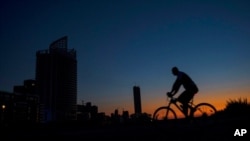Lebanese leaders agreed to a short-term compromise to maintain fuel subsidies, the presidency and prime minister's office said Saturday, a move that will trigger more price hikes.
Earlier this month, the central bank said it could no longer support fuel imports at a preferential exchange rate, in what many saw as a de facto end to subsidies.
Widespread panic ensued, with distributors scaling back deliveries until new prices were announced and desperate motorists forming long queues outside gas stations.
At a time when the state electricity supply is almost nonexistent, fuel oil to run backup generators to power homes, businesses and even hospitals has also been in short supply.
On Saturday evening, the presidency announced approval of a "request for the Bank of Lebanon to open a temporary account to cover urgent and exceptional subsidies for fuel."
Up to $225 million would be set aside to subsidize imports of gas, fuel oil and cooking gas until the end of September, it said.
The compromise was struck at a meeting attended by the president, the central bank chief and the caretaker prime minister, as well as the outgoing ministers of finance and energy.
Currency hit hard
Lebanon's currency, the Lebanese pound, is officially pegged at 1,507 to the U.S. dollar, but it has lost more than 90% of its value on the black market.
The central bank previously provided fuel importers with dollars at an intermediate exchange rate of 3,900 pounds to the dollar, and fuel prices were fixed by the energy ministry based on this rate.
The Bank of Lebanon would now ensure the ministry could set prices based on an exchange rate of 8,000 pounds to the dollar, the presidency and the prime minister's office said, signaling a new increase in the price of petrol and fuel oil.
Lebanese officials have blamed the fuel crisis on hoarding by distributors seeking to sell at higher prices, as well as smuggling to war-torn Syria.
Lebanese economist Nassib Ghobril said the agreement was a compromise that sought to allow fuel importers to release more stock and reduce shortages.
"But it will not solve the problem," the chief economist at the Byblos Bank Group said.
"The solution is to lift subsidies completely. That would lead to the disappearance of these long lines at the gas stations, and discourage smuggling," he said.
Crackdown on hoarding, smuggling
In recent days, the army has forced filling stations hoarding petrol to sell it, and security forces have cracked down on smuggling.
Saturday's decision came a week after a fuel tank blast killed more than 30 people clamoring for petrol in northern Lebanon.
Lebanon is mired in what the World Bank has described as one of the world's worst economic crises since the 1850s. More than three-quarters of its population now lives in poverty.
The U.N. children's agency earlier on Saturday warned power cuts were also impeding access to safe water.
"More than four million people across Lebanon … face the prospect of critical water shortages or being completely cut off from safe water supply in the coming days," UNICEF said in a statement.
"UNICEF is calling for the urgent restoration of the power supply — the only solution to keep water services running."
The government stepped down a year ago after a massive blast in Beirut port that killed more than 214 people, but it has stayed on in a caretaker capacity amid deadlock over a replacement lineup.




